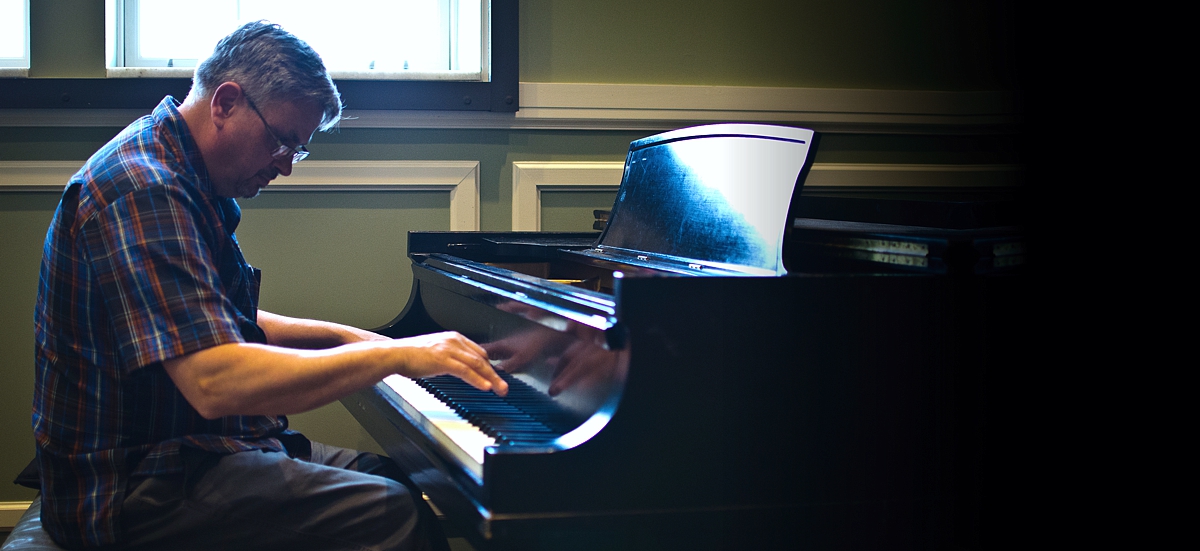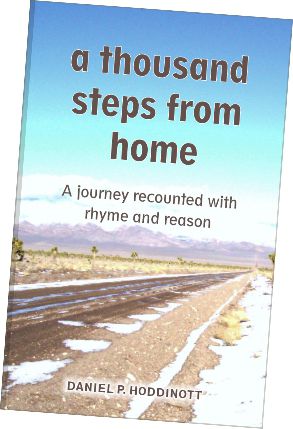Poet's Song
The story behind the writing of "Trevecca"

This section is a place set aside for showcasing some of my poetry. Not all of it is current. It's a sampling of works created through the years, presented here in the interest of whetting your appetite for my new book, A Thousand Steps from Home, which rolled off the press in October. You can use the form below to offer feedback.
Other works: Damned Fools | The Alchemist | Young Wisdom
"Trevecca": The back story
Trevecca Nazarene University in Nashville stands as my Mecca. Not a place of epiphanies, necessarily, because the impressions that comprise the resulting evaluation happened over hours and days and weeks and years, not seconds. Still, the most transforming event of my creative life is the collection of years in which I attended the Steve Hurst School of Music and then the Stamps-Baxter School of Music on these grounds. In the early years I thought it was mainly because of the music, since I was getting my 15 minutes of rollin' as a musician in Nashville, and getting to participate in what to me was the most meaningful musical expression. Those elements were present, of course, but there was more. It had to do, I think, with a sense of place.

A THOUSAND STEPS FROM HOME: Look for my latest book of poetry in bookstores, or you can order it here.
I've developed a love of lengthy poetic works in recent years. Series of unrelated vignettes have their place, sure, but I like being able to stay awhile and have my dawnings occur in that place before I'm asked to leave. "Trevecca" represents that acquired bent. It is also very personal, for it connects right at the outset with my musical/creative muse, remaining there for the duration.
"Personal" is a tightrope every poet must walk, for relevance is often dependent upon clarity of observation, even when describing essence over detail, as I have done here. The work still needs to argue a point, of course, without which the personal observation has no public value. Unless it can say something greater than itself it is no more than a casual remark. The risk in structuring a social argument around a scenario that is true — or at least true enough — is failing to get that greater truth to ring.
The glory of my visions
Cursed I was... might seem like an odd way to lead off (and then return to) what is essentially an ode. Well, you have to allow for irony, of course, and here it is — early. Of course I was glad to be there. Each year. Every year. And to be so affirmed, not only as a singer and stage performer but as a wanderer come from afar, acutely aware of the miles having trod, but made to feel he belonged in the conversation. I believe I've conveyed that in the opening stanzas.
Cursed are the wanderers come, for here they see the glories of their visions. (That kind of irony, you know.)
Before we cue the group hugs and the saccharin, however, let's bear in mind that all this wonderful stuff happened to a mature student, whose odometer and gas gauge both showed a significant portion of the journey was already behind. Also worth pointing out is that I got there by the most circuitous of routes and by time I arrived I had lived beyond the reach of meaningful graduation. More importantly, I believe, I had already forged identities that were ... not this.
Cursed, then (this time not ironically), to achieve self-realization at the same time as dawns awareness of it having come too late. See, I did not begin my music education nor begin performing in Nashville. I began to study gospel music there, and also found the door into performance of this particular genre that always resonated in me more completely than did any other.
Singing in a gospel quartet was my ideal model of singing in a band — a light by which all other lights were dimmed (perhaps foolishly and perhaps to the unintended disrespect of other genres that also provided perfectly good storytelling opportunities). And I found camping in Canaanland like this sweeter than imagined. Cursed, though, to realize that, outside the 15 minutes in Southern Gospel music in the U.S. South I would know, there was nowhere to take it in any meaningful way in the world in which I exist. And in a genre so set in its ways that expressions foreign to my person are staple and expressions natural to me get the third degree, there is no audience for what I, as an artist, would bring to that particular art form.
Dang.
Beyond the music, contemplation
The poem also mourns the parallel assertion that education is wasted on the young, who have not yet attained a state of maturity that would let them appreciate and maximize the opportunity or to discern meaningful data in the streams of information that flow past them.
Hmm. Points (and counterpoints) to ponder.
That's what benches on a hill overlooking the Trevecca campus and the Nashville skyline are for. (Right, Batman?)... Occupying my bench gave me a place to feel as well as consider these things: the joys, the losses, the hope, the letdown. Of course, some of the reflection was on my having squandered education in my own youth, and also that the 18-year-old me was offered that (read: incompatible) kind of education and not this kind. That said, I could not identify a single thing about the person or the world I grew into on those other roads that I would dismantle in order to fit in now.
The music schools eventually moved on from Trevecca. I found myself even more compelled to wish to stay. I would have been just as content, after waving our sad goodbyes, to get up off the bench and head off to some other class — say, philosophy. I would have been just as happy to find myself working toward some degree I had failed to acquire earlier in life. I would wish for that pursuit to have occurred here, for I had found an acceptance of the constituent parts of my self at Trevecca that neutralized prejudices encountered at other educational institutions.
Indictment of the educational system is not a particularly pressing point in the poem, though I believe the hypocrisy of "religiously" secular institutions that tend to foster their own flavor of prescribed thought deserve pointing out at every opportunity. I don't know that Trevecca is academically superior to any other institution, nor even morally so in the experience of a student who might come from a tradition not entirely compatible with Trevecca's established worldview.
We seem to know our kind
For all the freedoms Canadians like to be recognized for, across-the-board freedom of worldview is not one of them; its educational system works studiously at making certain perspectives unwelcome. It was more than just the music that made Trevecca feel like Canaanland; we seem to know our kind indicates I felt free to speak without expectation of being systematically shunted to the spur lines, as I've had occasion to expect in places where exists devotion to secularism and its safeguarding.
I live a secular life myself, and chafe at the notion of societal theocracy. But I'm not devoted to secularism, and am affronted by the expectation of such, especially in cases where intellect and ideas are sacrificed upon its dreary altars. Secularism is fine as an idea and an ideal, but it forms the basis of only one of many worthy worldviews.
(For the record, I consider myself a survivor of both the cult of positive thinking and the priesthood of official skepticism, the one having used up all its fuel without getting me off the ground and the other having exposed itself, by way of sneer, as not exempt from selectivism and superiority complex after all. Still, whenever it succeeds in detaching from emotion, skepticism does offer a credible framework upon which to promote critical thinking.)
The greater truth embedded in the passage that swipes at these hypocrisies is that organized movements — including those that I favor — are subject to the tendency to corral people into their way of thinking. Skeptics, mentioned above, lost me as a disciple, but I am secure enough in my own thought processes to still find meaning and enjoyment in some of their dissertations. Not that I am so embittered as to spew them out of my mouth; just that they have lost the moral authority to have my thoughts measured by them. And to be fair, not that I am so enamored of Trevecca as to swap out my own philosophical understandings for theirs; just that the process of education itself is accelerated greatly where vexation by prejudice is absent.
My bench was good to me. It let me stay long enough to work through all these things, and in the end when I had to leave it was with the clear understanding that I must leave. The life I lead is the sum total of my experiences, my acquisitions and my identities. I belong in that world, not the one that might have been before I was this man. And I find I am okay with that. On most days.
Preacher, professor and confessor... Cursed to be all three, yes. But also blessed to find myself freed to follow my own creative expression wherever it may lead, for the well from which I drink seldom serves up the obligatory glee that is a staple in gospel music. (Not that I'm necessarily incapable of joy, but I do uneasy joy better. Or reverent sorrow.) Even when it is to pluck regret and then my opus off a battered heart and six-string, what I've been doing while waiting for that great gospel quartet to materialize around me is really where it's at for me. Even if satisfaction remains elusive.
I guess it took time at university to settle that.